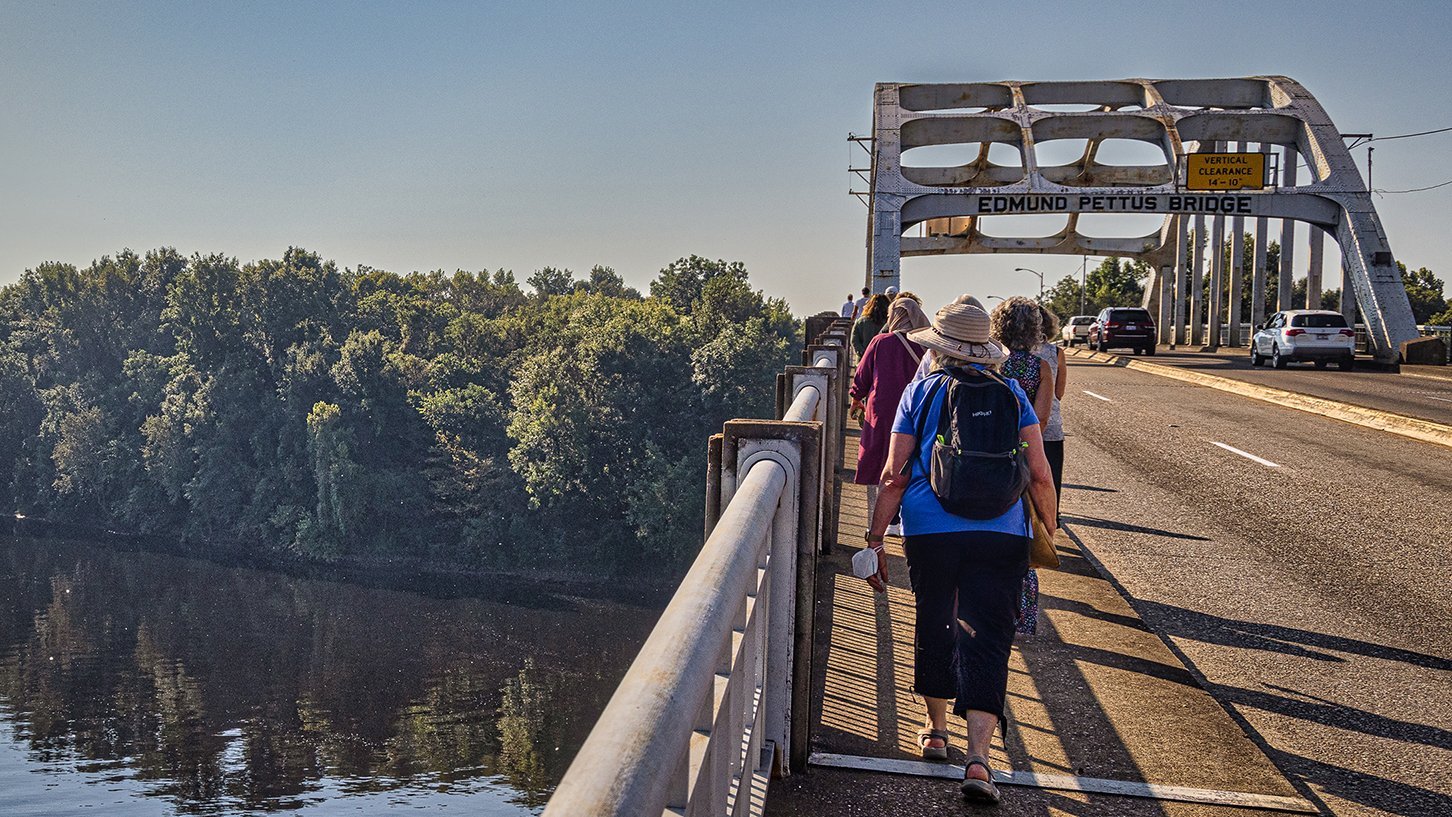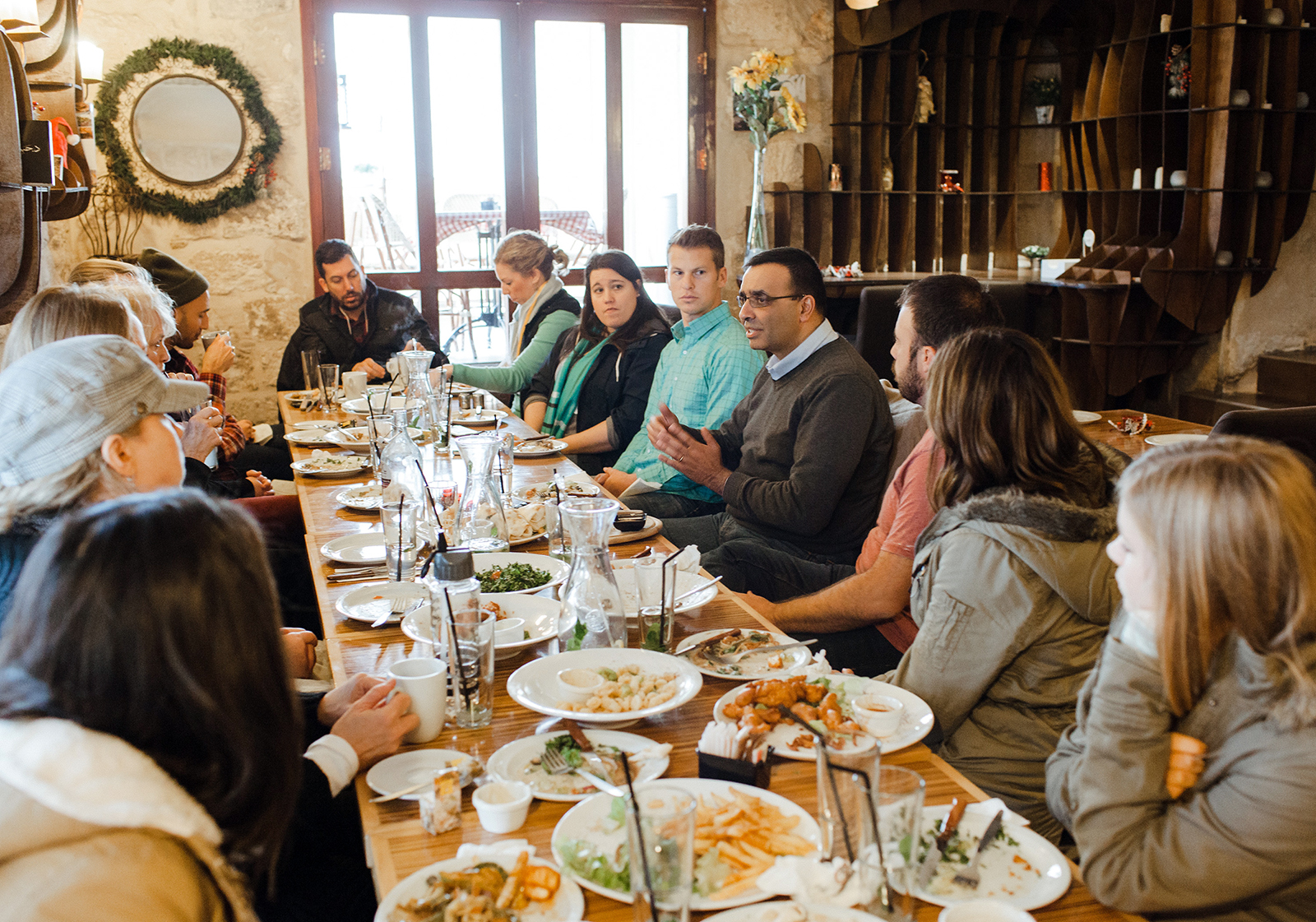
Tour members have an educational meal during a stop on a Telos Group trip to the Holy Land. (Photo by Kevin Rogers via Telos)
NEW ORLEANS (RNS)— When Greg Khalil and Todd Deatherage co-founded the Telos Group, a peacemaking nonprofit, in 2009, they began by shuttling back and forth between the U.S. and Israel, hoping to help Americans — especially the evangelical Christians who remain staunch supporters of Israel — rethink how they see the seemingly unsolvable conflict between Israelis and Palestinians.
The two have since taken more than 2,000 people to the Holy Land, each trip built on the premise that peace depends on mutual flourishing and that a peaceful future for the Middle East is one where freedom, security and dignity are available for every human being. They named their effort after the Greek word for aim, or goal.
But in recent years, the nonprofit has begun addressing another seemingly intractable problem: America’s growing polarization and enduring racial divides.
On a recent Telos bus tour from New Orleans to Birmingham, Alabama, Khalil gave a group of about a dozen New Yorkers a brief introduction to Telos’ principles of peacemaking. Quoting from theologian Paul Tillich, physicist Niels Bohr and Sufi poet Hafiz, Khalil told them that ending any conflict begins with listening.
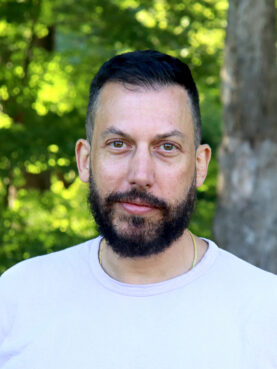
Greg Khalil. (Photo courtesy Telos Group)
That’s a rare practice, especially in modern-day America, where most people would rather debate than hear someone else’s point of view, especially when encountering painful issues, or simply tune out. “When we turn away from each other and we turn away from these problems they don’t go away,” said Khalil.
Khalil also reminded his audience on the bus that none of us has the whole story. All of our perspectives are incomplete. Listening — even to our enemies — can help us see things we would have otherwise missed. Another core idea: You never know when someone you once dismissed might become a valuable ally.
That’s something Telos’ founders experienced firsthand. The two first met in Jerusalem in 2004, when Khalil was a young progressive lawyer advising Palestinian leaders during Israel’s withdrawal from Gaza, where Khalil has family. Deatherage was the chief of staff in the U.S. State Department’s Office of Policy Planning, and a conservative Republican. He’d previously served as chief of staff to Tim Hutchinson of Arkansas during Hutchinson’s time as a congressman and U.S. senator.
Khalil had often written off conservatives like Deatherage, who grew up in the town of Fifty-Six, Arkansas, in a church that was so fundamentalist, he said, that they regarded Southern Baptists as liberals.
But the two shared a desire to move their fellow Americans’ understanding of the Israeli-Palestinian conflict beyond partisan camps that tended to side with either Israel or the Palestinians. They set about seeking solutions that serve both sides. “There could be no good future for anyone if there is no good future for everyone,” said Khalil.
Telos’ program in the American South, called ReStory US, applies the same thinking to the residual effects of slavery and racism.
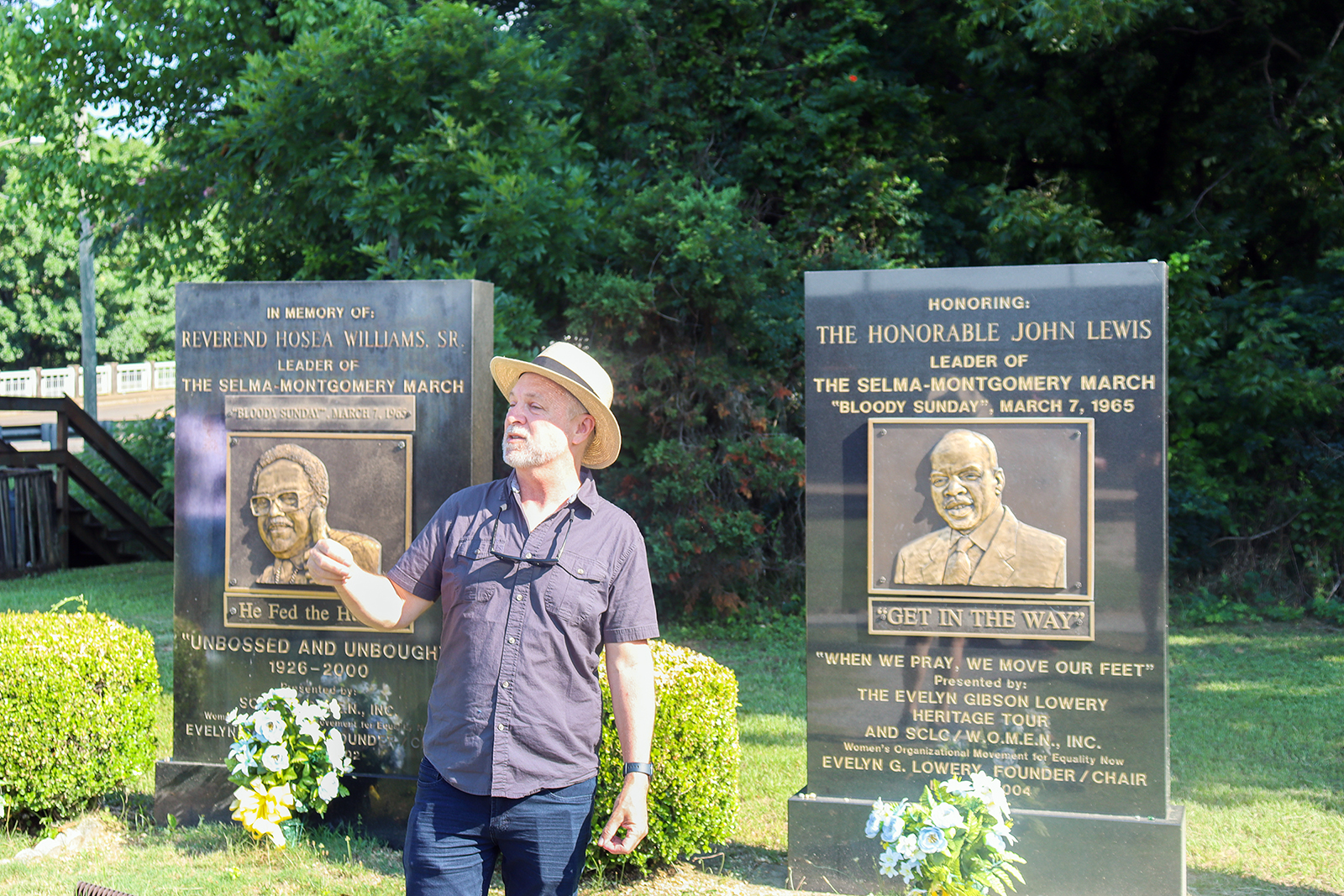
Telos Group co-founder Todd Deatherage speaks to tour participants in Selma, Alabama. (Photo courtesy Telos Group)
“Everyone encounters this history from a place of not knowing,” Yvonne Holden, director of ReStory, told the ReStory US group during the first day of the program. Her account of U.S. racial history and New Orleans’ role in it started further back than most Americans might expect, with the Doctrine of Discovery, a 15th-century papal proclamation that blessed Europeans’ efforts to colonize the New World. The doctrine provided a framework for a society where European Christians were seen as superior.
She moved on to founding contradictions of the Declaration of Independence and the U.S. Constitution, which both guaranteed freedom for many while denying it to slaves, Native Americans and others.
The next day, the group traveled to the Whitney Plantation in Edgard, Louisiana, where Holden worked before coming to Telos. Unlike historic Southern plantation sites that focus on the land’s owners, Whitney focuses on telling the story of slavery in Louisiana and beyond.
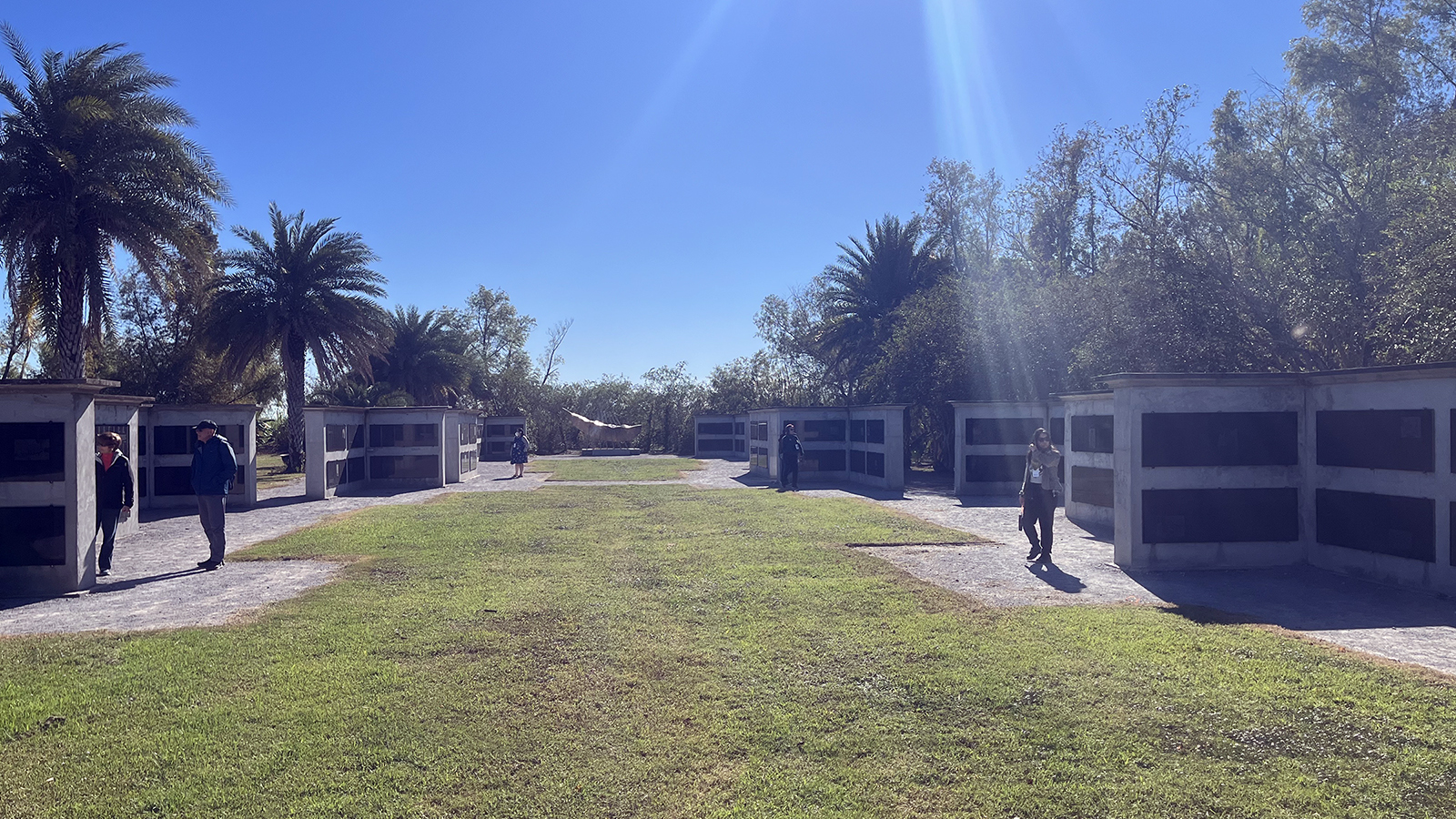
Telos tour group members visit memorials to people who were enslaved in Louisiana, at the Whitney Plantation in Edgard, Louisiana. (RNS photo/Bob Smietana)
The Whitney’s big house was empty of furnishings, making room for visitors to focus on the stories of the enslaved people who worked in the house, Holden said.
RELATED: Bethlehem pastors arrive in DC, urge lawmakers to embrace cease-fire, peace plan
“We get to fill this space with stories, and with the people we bring here,” she said. As an example, she told of a group of rabbis so moved by the place’s history that they filled the big house’s open rooms with sung prayers.
“Once you know, you are different,” John Cummings, a key player in founding the museum at Whitney, told the Telos tour group. A successful trial lawyer, Cummings bought the plantation from a chemical company whose plans to build a factory on the site had fallen through. With the property came a historical study the chemical company had commissioned that included records of its enslaved workers.
Reading those records sent Cummings on a quest to learn more about the history and later to turn the plantation into a museum—which is now owned by a nonprofit.
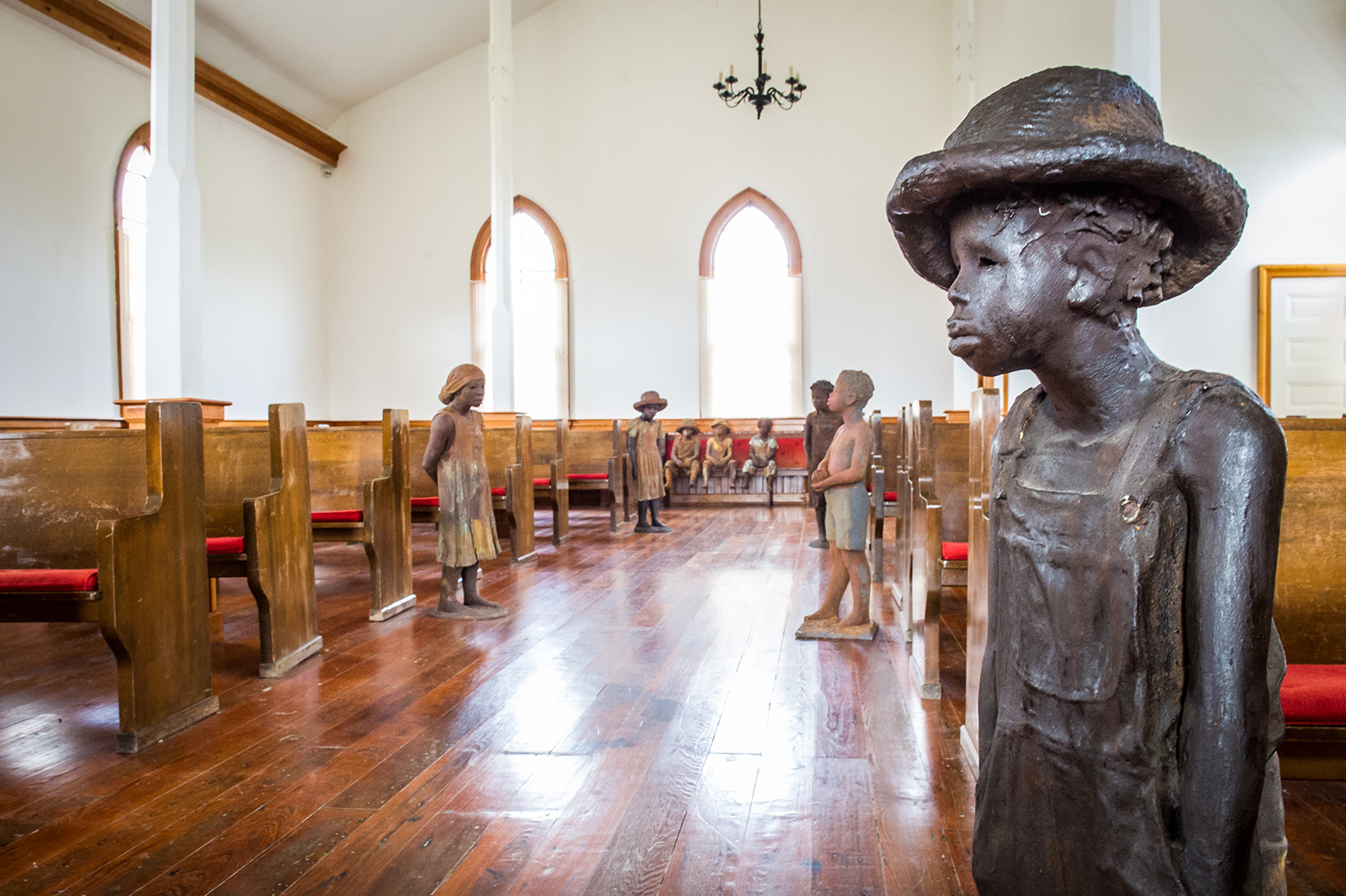
Statues of slaves in a church at the Whitney Plantation in Edgard, Louisiana. (Photo © Elsa Hahne)
Cummings urged the tour group members to not only spread the word, but turn their experience into action.
That kind of transformation is exactly what Telos is after.
“Instead of telling people what to think, we take people on a journey,” said Holden. “When people get to the point where they are thinking, ‘Oh, wait, I might have something to contribute to a more equitable future as an American,’ it’s amazing.”
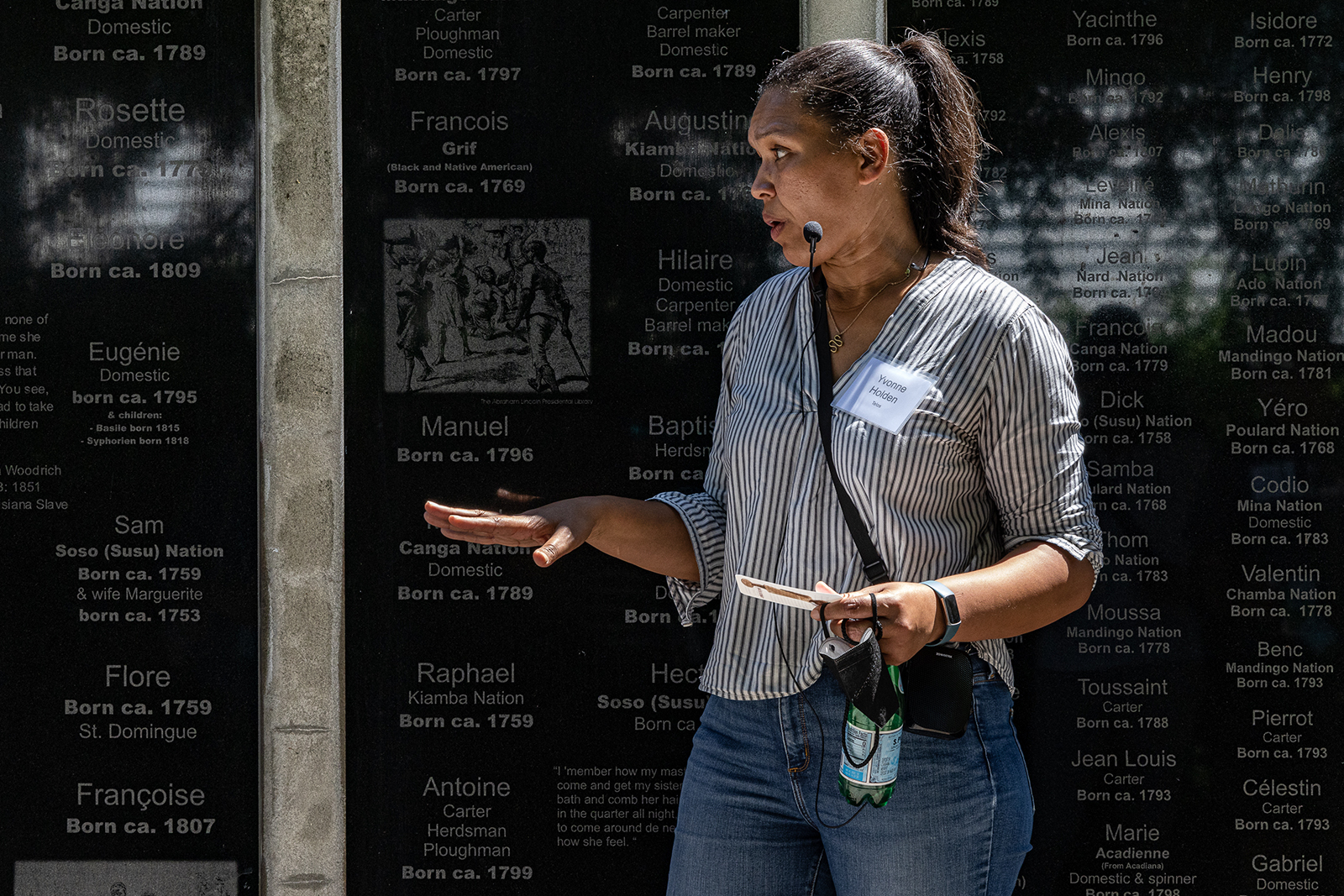
Yvonne Holden leads a ReStory tour group on the Telos American South program. (Photo by David Altschul via Telos)
On its way through the Mississippi Delta region, the bus stopped at the ruins of Bryant’s Grocery in Money, Mississippi, where Emmett Till, a Black teenager from Chicago who was visiting family in Mississippi in the summer of 1955, was said to have whistled at a white woman. A few days later, Till’s brutalized body was found in the Tallahatchee River.
The ruins of the store stand not far from a historical marker and a restored 1950s-era gas station often mistaken for the site of Bryant’s Grocery. The ruins themselves felt like a metaphor for America’s history of dealing with race — something always there and often ignored.
From there the group traveled to Sumner, Mississippi, to the courthouse where Till’s killers, Roy Bryant and J.W. Milam, were acquitted at trial. (They later confessed to the killing in an interview with Look magazine.) Outside the courthouse, now part of a National Park Service monument, stood a statue that honored Confederate soldiers who served “a cause that has not yet failed,” according to an inscription.
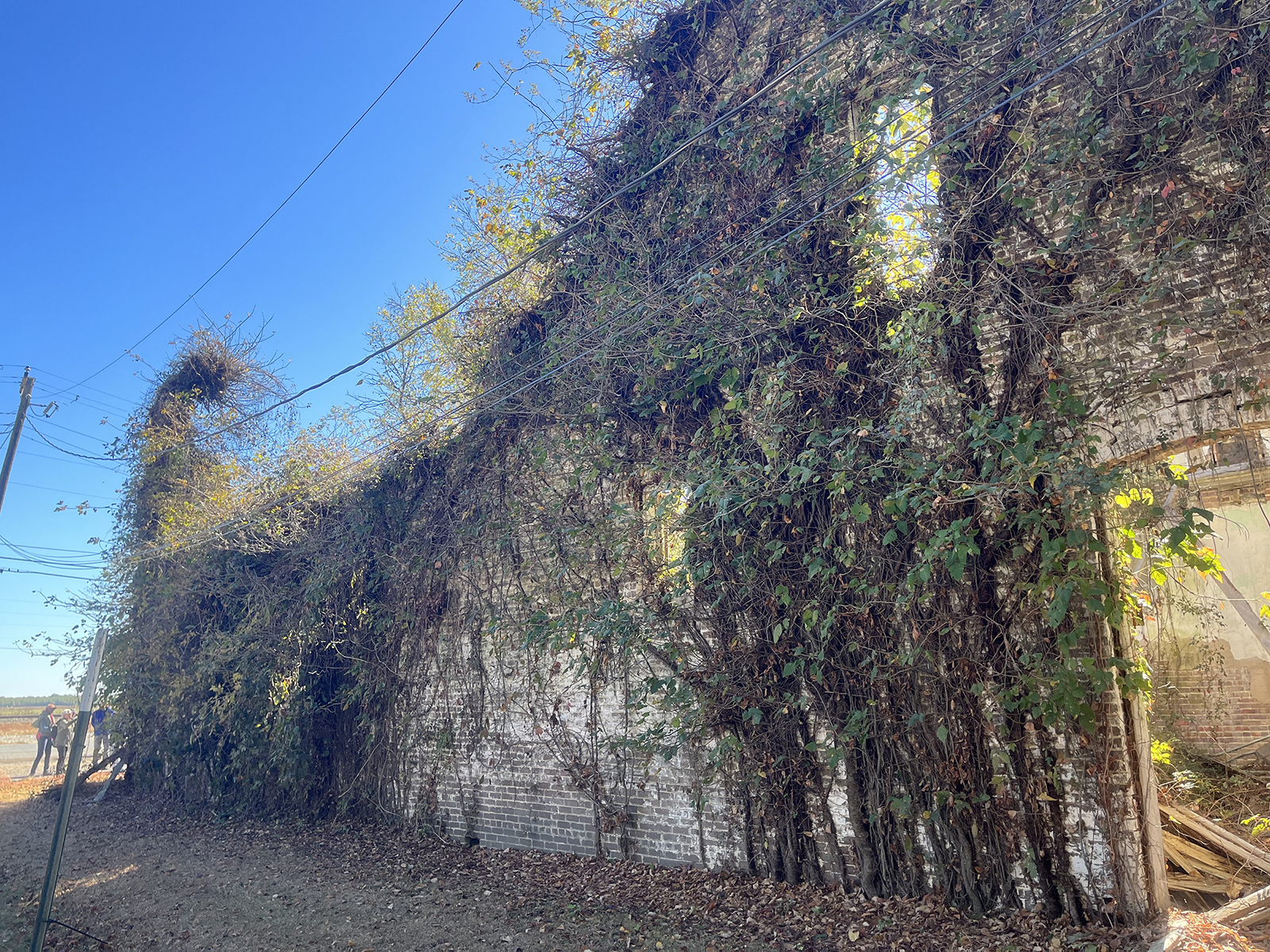
A Telos tour group stops at the dilapidated ruins of Bryant’s Grocery in Money, Mississippi, where Emmett Till supposedly whistled at a white woman, the incident that led to his murder. (RNS photo/Bob Smietana)
Inside the courthouse, the group read aloud an apology that a biracial commission from the town had issued in 2007, more than 50 years after Till’s killing and the acquittal.
Many of those on the trip had ties to Melinda Wolfe and Ken Inadomi, who helped organize the tour. The couple had gone with Telos to Israel in 2017 and had been trying for some time to organize a Telos trip to civil rights sites in the South.
Wolfe said her experience on the bus, particularly its stop in Selma, Alabama, where the group walked across the famed Edmund Pettus Bridge, made her think about America’s origins differently. “When you go to the Deep South, you really question everything you ever learned in school,” she said. “How did I not learn these things? And what does that mean for my understanding of these problems?”
Inadomi said the trip was about more than learning facts. The stories they heard and the people they met created emotional connections to the history one might read. Inadomi came away struck by the resilience of people working for change in the South and their dedication to making things better.
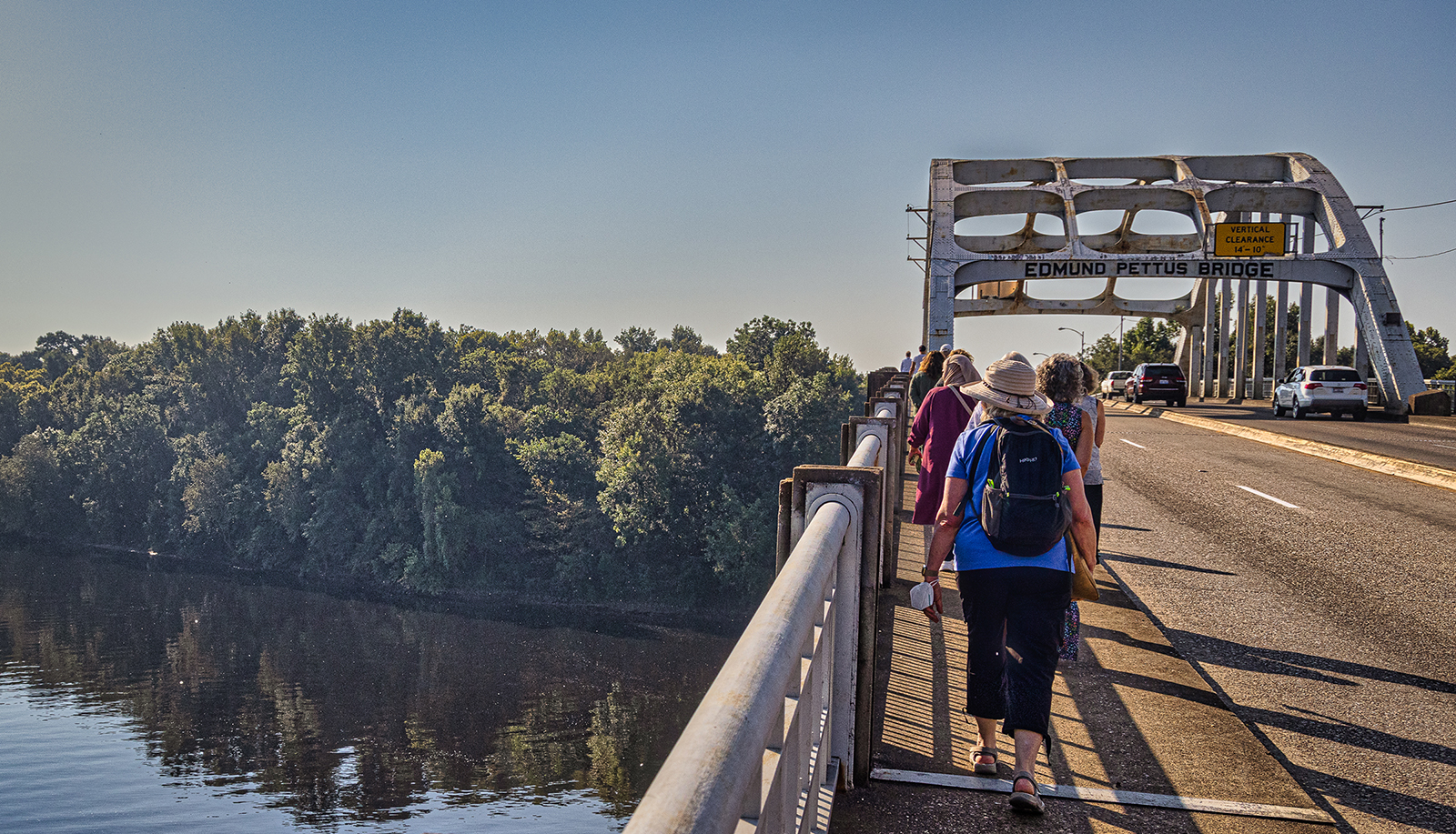
ReStory US tour participants walk across the Edmund Pettus Bridge in Selma, Alabama, in September 2022. (Photo by David Altschul via Telos)
The focus on listening also struck home. “If you go in with your mind made up, this is not for you,” he said. “If you go in with an open mind willing to listen, it can be a rich experience.”
RELATED: Jerusalem’s church leaders call for sober Christmas in Holy Land as war rages
Such connections, talk of resilience and mutual listening, can seem fragile in the face of events like the current war in Gaza. On Telos’ Holy Land experiences, groups of Americans meet with Israelis and Palestinians to get a deep dive into the recent history of the ongoing conflicts there. One such trip was supposed to occur days after Oct. 7. Some members of that group were already on their way to Israel when the attacks occurred.
Telos trips to Israel are now on hold for the foreseeable future. In recent weeks, Deatherage and Khalil have spent much of their time on the phone with their staff in the Holy Land, trying to do all they can for them while advocating for a cease-fire.
“I keep saying everybody is safe and nobody’s OK,” Deatherage said in a recent phone interview.
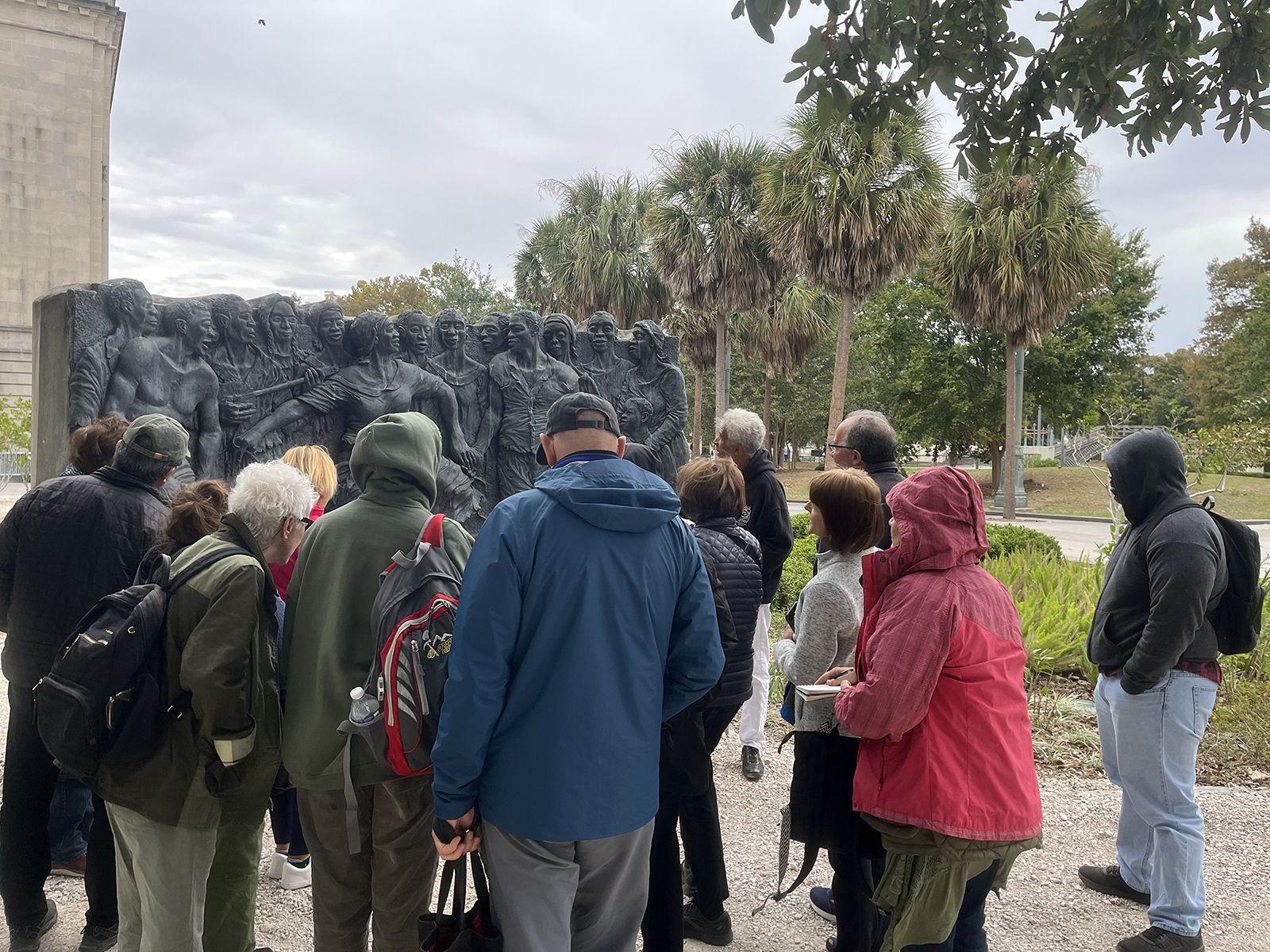
ReStory US tour participants visit the 2010 sculpture “Congo Square” by Adewale Adenle at Louis Armstrong Park in New Orleans. (RNS photo/Bob Smietana)
But despite seeing years of outreach work upset in the past weeks, Deatherage said Telos’ efforts are needed now more than ever, both in the Holy Land and in the United States.
“It’s easy to fall into despair,” said Deatherage. “But I can’t stay there, because I have hope — and because I know hope is something I can live into.”
This story was supported by the Solutions Journalism Network, a nonprofit organization dedicated to rigorous and compelling reporting about responses to social problems.

